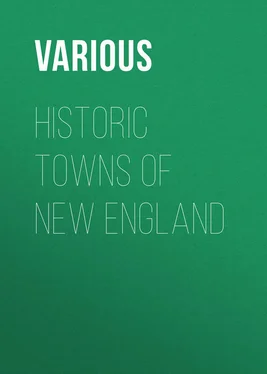Конец ознакомительного фрагмента.
Текст предоставлен ООО «ЛитРес».
Прочитайте эту книгу целиком, купив полную легальную версию на ЛитРес.
Безопасно оплатить книгу можно банковской картой Visa, MasterCard, Maestro, со счета мобильного телефона, с платежного терминала, в салоне МТС или Связной, через PayPal, WebMoney, Яндекс.Деньги, QIWI Кошелек, бонусными картами или другим удобным Вам способом.
De Tocqueville’s Democracy in America , chapter v. Mr. F. J. Lippitt, who assisted M. de Tocqueville in the preparation of this work, says that once when they “had been talking about town-meetings, de Tocqueville exclaimed with a kindling eye (usually quite expressionless), ‘Mais, c’est la commune!’ ” — Cf. The Century Magazine , September, 1898, p. 707.
Geo. Wm. Curtis, Orations and Addresses , vol. iii.
In 1810, less than 15 per cent. of the population of Rhode Island was found in towns of 8000 or more inhabitants; in 1890, nearly 80 per cent. In Massachusetts, in 1790, five per cent. were urban dwellers; in 1890, 70 per cent. In Connecticut, in 1830, 3 per cent. lived in cities; in 1890, more than 50 per cent. In 1840, 3 per cent. in New Hampshire lived in cities; in 1890, more than 25 per cent. In 1820, in Maine, 4 per cent. lived in cities; in 1890, 20 per cent.
Cf. Town Records of Brookline, 1897-98.
Chapter cii., Bryce’s American Commonwealth . For an interesting and significant account of the impression made by one of the Western Christian colleges upon a friendly and thoroughly trained French observer, see the translation of an article by Th. Bentzon (Madame Blanc) in the Revue des Deux Mondes , printed in McClure’s Magazine , May, 1895.
See Editor’s Preface p. v.
The Ordinance of 1784, the original of the Ordinance of 1787, was drawn up by Jefferson himself, as chairman of the committee appointed by Congress to prepare a plan for the government of the territory. The draft of the committee’s report, in Jefferson’s own handwriting, is still preserved in the archives of the State Department at Washington. “It is as completely Jefferson’s own work,” says Bancroft, “as the Declaration of Independence.” Jefferson worked with the greatest earnestness to secure the insertion of a clause in the Ordinance of 1784 prohibiting slavery in the Northwest; and the clause was lost by only a single vote. “The voice of a single individual,” said Jefferson, who foresaw more clearly than any other what the conflict with slavery was to mean to the republic, “would have prevented this abominable crime. Heaven will not always be silent. The friends of the rights of human nature will in the end prevail.” They prevailed for the Northwest Territory with the achievement of Manasseh Cutler, Rufus Putnam and Nathan Dane.
Was it from Jefferson that Putnam and his men at Marietta caught their classical jargon? There was a great deal of pretentious classicism in America at that time, new towns everywhere being freighted with high-sounding Greek and Roman names. The founders of Marietta – so named in honor of Marie Antoinette – named one of their squares Capitolium ; the road which led up from the river was the Sacra Via ; and the new garrison, with blockhouses at the corners, was the Campus Martius . Jefferson had proposed dividing the Northwest into ten States, instead of five as was finally done, and for these States he proposed the names of Sylvania, Michigania, Assenisipia, Illinoia, Polypotamia, Cherronesus, Metropotamia, Saratoga, Pelisipia and Washington.
Rufus Putnam was born in Sutton, Massachusetts, April 9, 1738, just fifty years before he founded Marietta, where he died May 1, 1824. He was a cousin of General Putnam. Early in life he was a millwright and a farmer; but he studied mathematics, surveying and engineering – after distinguished service in the old French war – and became our leading engineer during the Revolution, and an able officer in many campaigns. He first planned the Ohio settlement, and at the outset made it a distinct condition that there should be no slavery in the territory. Five years after the founding of Marietta, Putnam was made Surveyor-General of the United States; and his services in Ohio until the time of his death were of high importance.












